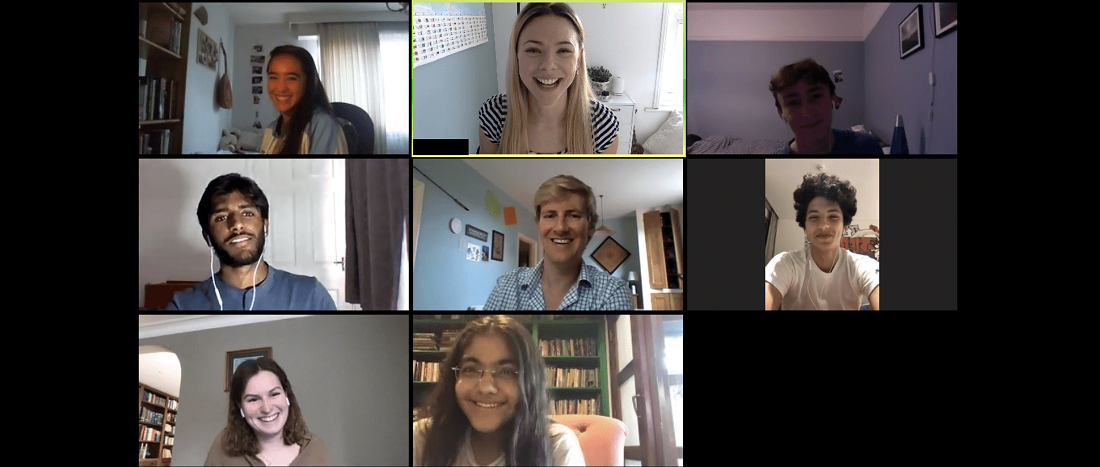How to Choose the Best Online Academic Courses for Teens

Whether you’re looking for an academic online course to stretch yourself beyond the school curriculum, or a chance to explore a subject you’ve never experienced before, it’s important to make sure you find the right fit for you. After months of virtual learning for school, you want to make sure you find an online course that’s going to keep you engaged, possibly across a period of several weeks.
That’s why we’ve put together this ultimate guide, covering everything from the length of lessons to the subjects on offer, to make it easy for you to find your perfect online course for teenagers. We’ve included some recommendations from our alumni, too!
This question has become even more common since things have started to reopen following lockdowns. Why would you opt to learn through a screen when you could find an in-person course instead?
Well, we’re glad you asked…
Expertise
You might have a myriad of in-person courses run by world-leading experts on your doorstep if you live in Oxfordshire, UK or Cambridge, MA. In most cities, though, you’re likely to have a limited selection of academic courses for teenagers. By moving online, you can tap the expertise of the best academics at any top university, wherever you’re based.
Choosing an online course also allows you to really hone your expertise in your own specific areas of interest. Rather than a generic sociology course, you could experience a programme exploring the pursuit of perfectionism on the adolescent psyche.
EdX, recommended by our alumnus Sahil (Experience Debate & Public Speaking Academy 2018) is a great example of online courses allowing students to find the right expertise wherever they are in the world. With courses from a stunning range of leading schools such as the Sorbonne, Harvard University and Imperial College, London, you’re sure to find a leading academic running a course in your chosen subject – no matter how niche!
Flexibility
In addition to the flexibility of choosing an academic online course that suits your interests, virtual programmes offer flexibility in a more practical sense. By eliminating commuting time, online courses fit far more easily into your existing schedule – whether that’s the regular school day, or your holiday plans.
You’re also less likely to have to skip sessions because of trips or travelling; as long as you have an internet connection, you’re good to go! Even better, if you do have to miss a session for whatever reason, your online course provider will likely be able to supply you with a recording of the session to catch up.

Cost
Without the need to rent classrooms, take into account the tutors’ travel costs and other overheads, online courses are almost always less expensive than in-person offerings.
It is worth remembering that in-person courses might be able to offer some practical experiences that aren’t quite the same online (especially in STEM subjects), but virtual options are still excellent ways to refine your knowledge of a subject. You could try an online course before deciding whether you’d like to take a more costly in-person alternative in a given subject.
Our Discover Technology Academy and Discover Business Academy 2021 alumnus, Quentin, recommends Skillshare courses as a really great way to learn something new. Skillshare allows teachers to create the courses that matter most to them, meaning you get to learn from a range of professionals who are truly passionate about the skills and subjects they are teaching.
International perspectives
A very important bonus that comes with the flexibility online courses offer, especially in an increasingly global society, is the wide range of truly international perspectives that you’ll encounter. You might be taking an international relations course from the US and have classmates joining from China, Kenya and Italy, or be studying Medicine alongside students from the UAE and Brazil.
Not only is it exciting and valuable to build an international network in your subject, it also exposes you to viewpoints and cultural considerations you might not otherwise be able to access.
Things to consider when choosing an online course
So, online courses for teenagers come with a whole host of benefits, but with hundreds, if not thousands, of different providers out there, how do you find the perfect one for you?
We’ve put together a list of some important things to consider when you’re choosing an online course. It’s not exhaustive, and really the best way to judge whether a course will be a good fit for you is to chat with the providers directly. If you’re considering an Oxford Scholastica Online course, you can book a call with Stephanie to chat through any questions you might have.
One way to get around considering time zones is to take an iteration of a course that’s being run in your country, or somewhere nearby. A provider like IDG Leadership, for example, runs courses with local providers around the world, allowing everyone to benefit from their expertise in their own time. Our alumna, Alia (Experience Debate & Public Speaking Academy and Experience International Relations, Politics & Leadership Academy, 2021) couldn’t speak highly enough of the IDG course she took!

Language requirements
If you are considering courses hosted in different countries, time zones aren’t the only thing to consider. Most online courses will have minimum language requirements. It’s worth bearing in mind that the more advanced or specialised the course, the higher the requirements are likely to be.
It’s important to make sure you genuinely meet the requirements of a course; if you’re struggling to understand what your tutor is saying or interacting with your peers is hindered by a language barrier, you won’t fully benefit from the programme.
Choosing a course that is taught in a different language can be particularly helpful if you’re planning to study at a university that teaches in the same language. For example, an English Engineering course can help you to develop the technical vocabulary you would encounter if you chose to study Engineering at Oxford.
Group size
Some providers might keep their costs especially low for online courses because they raise their caps on the number of students admitted to each cohort. By having larger class sizes, the price can decrease, but the quality of your experience might also be reduced.
When you’re choosing your course, you should balance the importance of personalised teaching and getting to know your classmates with your budget.
Of course, there are also benefits to having a larger class size; you will likely be exposed to an even wider range of perspectives and you can turbo charge your network. You might also have more opportunities for peer-to-peer learning.
Interactivity
Linked to group size, and just as important to consider, is how interactive you’d like your academic online course to be. If you’d like to gain a foundation knowledge of a subject through lecture-style classes, then the amount of people in your cohort is less important. If you’re looking for more of an active learning option, and would like the opportunity to ask lots of detailed questions, you’re more likely to favour small group sizes.
The platform that the online course is hosted on could also play a part in this; some online courses are pre-recorded videos that you gain access to watch in your own time, while others use live video platforms like Zoom to create more conversational environments.
Sometimes, you’ll be looking for a live course with direct interaction with your peers and your teacher. Other times… Well, you want the information, but you might like to explore it at your own pace, with minimal live contact required. Courses like IBM’s highly technical offerings allow you to explore and digest the information in your own time, to fit around your schedule. Our alumnus Mario (Experience Computer Science & Coding Academy 2018) recommends these!

Reviews and recommendations
Often, the best way to find out about an online course provider is to look at what other people are saying about their experiences with them. This can be particularly helpful when you’re trying to find out the details about things like the importance of language requirements and the quality of the course content.
Be sure to look at reviews on independent third-party sites, and try to look at reviews with a range of ratings. If there’s something that is particularly important to you, for example the interactivity of a course, many review websites will allow you to search reviews by keywords.
Word of mouth recommendations from people you trust, whether that’s a careers advisor at school or a family friend, are also a great measure of an online course and can be more personalised than general reviews.
Conclusion
Even after you’ve decided that online courses are the best option for you, choosing an academic online course for teenagers can seem almost impossible with so many different options available. We hope this article has given you a checklist of things to think about as you find your perfect online course.
If Oxford Scholastica Online sounds like it could be the best fit for you, we’d be more than happy to answer any questions you might have. You can find out more about our online courses here, or get in touch with us directly and we’ll be more than happy to help!
Want to explore a range of top-rated online courses?
Recommended articles
Best Universities to Study Medicine in the World
A degree in Medicine spans many years, so it’s important to make a good choice when committing yourself to your studies. This guide is designed to help you figure out where you'd like to study and practise medicine. For those interested in getting a head start, the...
What Is A Year Abroad?
One of the great opportunities offered to UK university students is taking a year abroad. But what does this involve? Who can do it? What are some of the pros and cons? In our year abroad guide, we’ll explain some of the things to bear in mind when considering this...
The Ultimate Guide To Summer Internships
Are you eager to make the most of your summer break and jumpstart your career? There are so many productive things students can do in the summer or with their school holidays, and an internship is one of the most valuable! A summer internship could be the perfect...


